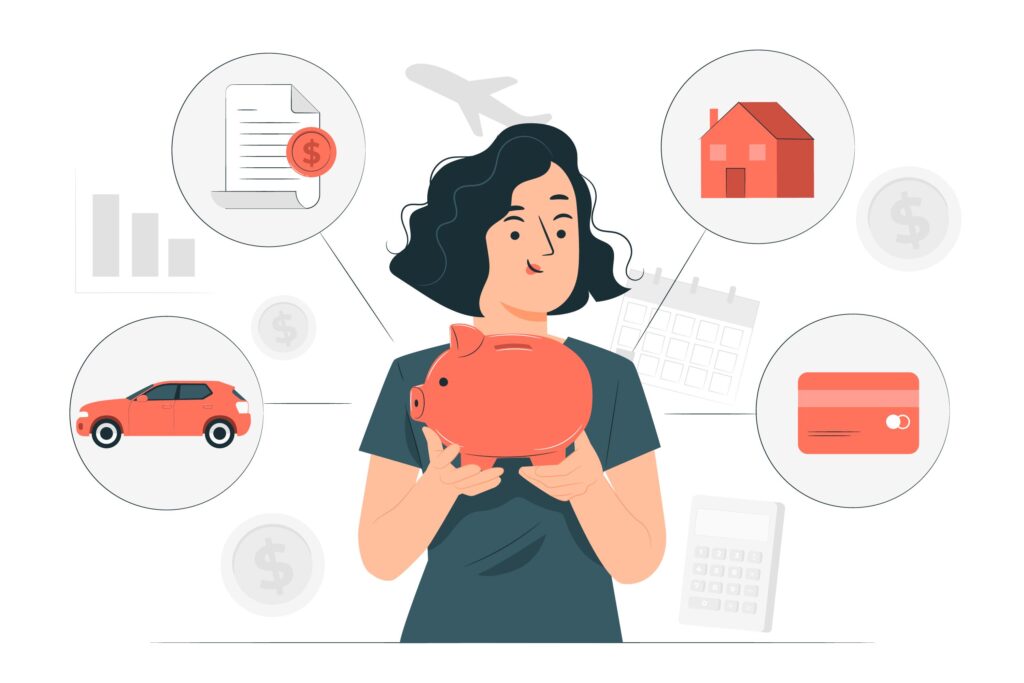Ever heard of the term personal finance? Wanting to improve the way you handle your finances and know more about it? You’re looking into the right page!!
Personal finance is all about managing your money or your family’s money, which comes along with taking the responsibility for your present-day and your future finances. Putting this in simple words, Personal finance is managing your money as well as saving and investing. To do this, you’ll need money obviously, and you get this through your income, but how do you spend it?

There are five fundamental areas to focus on when it comes to personal finance, which are – income, spending, savings, investments and protection. Let’s look into each of these in detail!
Income is the basement of your building. It helps you start your personal finance. You usually get your income through your jobs, dividends or wages, but what if you’re a student? Or someone without a job? You can always look into websites such as freelance, upwork, toptal,linkedIn and more to earn money and build yourself your base!
When you pay your rent, you spend your income. When you go out for dinner, you spend your income. When you travel, you spend your income. When you watch a movie, you still spend your income. Spending is where most of us lose almost all our income. You must make sure you spend less than your income, and more importantly, limit your spending. Spending more than your income can lead you to debt.
If you have some money left after spending from your income, you can call it your savings. When you save money, you’re saving yourself in the future, where you could have fluctuations in your job or anything for that matter!
When you have money, you say you’d like to invest it so you gain more money in the future, but, does it always lead to more money? you never know. Investing, broadly, is putting money to work for a period of time in some sort of project or undertaking in order to generate positive returns. People usually invest to get money for a new business, or mortgages, or any asset they would like to acquire. Investing is totally different from savings. When you invest, you put money to work. When you put your money in a savings account, it just sits there. Some investments you can try are:
- Stocks – represents ownership in a corporation.
- Bonds – debt obligation of governments, municipalities and corporation
- Funds – pooled instruments managed by investment managers that enable investors to invest in stocks, bonds, preferred shares, commodities, and more.
- Alternative investments – all investments except stocks, bonds, or cash
Now, the real question everyone should be asking is, “how do I invest?”
Easy, either follow the do-it-yourself ( DIY ) method where you are the only person handling everything that goes on in your investment or you could go for professionally managed investment where you’ll be guided with professionals. An alternative for the professionally managed investment is that you could go for robo adviser investing where you will get credible resources and suitable recommendations for a cost lesser than what you will have to pay the professionally managed investment.
The last thing you are going to have to do is to protect. And I’m pretty sure everyone has come across the word insurance, and you are right, you are going to take insurance!
A few personal finance strategies to know:
- Know your income – know what you have later on, once you’ve paid all your taxes.
- Devise a budget – I’d say it’s safer to follow the 50-30-20 budget where 50% of your income goes for living essentials such as rent, groceries and more. 30% of your income goes for discretionary expenses and 20% of your income goes to your savings.
- Pay yourself first – ensure money is set aside for unexpected expenses
- Limit and reduce debt – Of course, most people have to borrow from time to time, just make sure to limit that chance.
- Only borrow what you can repay
- Monitor your credit scores – this could totally come in handy when you’re asked for proof of purchase.
- Buy insurance!!
Managing money and having knowledge on personal finance can ease your future expenses as your money will be organised and you will have savings to back you up in the future. It’s never too late to plan your budget and handle your money! Even the smallest step counts, so take it today!








